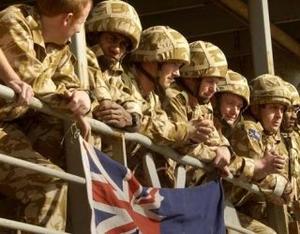Olympics securityBritish military gears up to secure 2012 Olympic Games
As London gears up for the 2012 Olympic Games, event organizers and government officials have spared no expense on security measures to ensure the safety of the hundreds of thousands of athletes, spectators, and VIPS attending the six week event which begins on 27 July

Plans call for British military involvement in Olympic security // Source: security-technologynews.com
As London gears up for the 2012 Olympic Games, event organizers and government officials have spared no expense on security measures to ensure the safety of the hundreds of thousands of athletes, spectators, and VIPS attending the six week event which begins on 27 July.
As many as 7,500 British troops will be called in to assist the 16,200 private security guards, 12,000 police officers, and more than 6,000 armed personnel who will be securing Olympic venues as well as the surrounding areas.
In addition all of the military’s bomb sniffing dogs currently deployed in Afghanistan will be sent home to help detect explosives.
“The issue of explosive search dogs is crucial – they are the tools that will find the bombs, but we don’t have enough of them,” said one security official speaking anonymously to the Telegraph. “We have around thirty and they can only work for thirty to forty minutes before they get distracted or bored. From what I understand there will be virtually none left in Afghanistan – they will all be here.”
Working in twelve hour shifts, the troops will be used to search attendees before they enter any Olympic venue.
Lord Alex Carlisle, a former MP and counterterror legislation watchdog, welcomed the decision to use military personnel to conduct pat downs.
“It makes sense to use soldiers who have been trained in carrying out searches on civilians, in places like Northern Ireland and Afghanistan,” Carlisle said.
Carlisle was careful to note that security officials should not focus so heavily on Olympic venues that it leaves other areas vulnerable to attack.
“My concern is that we don’t displace so many people to Olympic venues that it leaves a risk elsewhere. Proper policing levels need to be maintained in other areas,” he said.
Officials are particularly concerned that an attack in the weeks preceding the games will force them to elevate security levels severely straining resources and complicating logistics.
“The real fear is that a single bomb somewhere in London a week or two before the games are due to begin will send security levels through the roof. Everyone will have to undergo a full body search, no vehicles will be allowed inside the Olympic park and it will take hours to get inside,” one anonymous official said.
Event organizers worry that such policies will result in even longer lines that could disrupt the Games’ schedule.
Meanwhile other security experts believe that terrorists are more likely to take advantage of the lax security elsewhere and target shopping malls, railway stations, or the London Underground.
“Al Qaeda historically have focused on transport network rather than events – but there is no room for complacency,” said one security official. “We know dissident republican would like to disrupt the games – it is after all a world event. And there is always the prospect of an unknown self-contained AQ cell in the U.K. carrying an attack on their own.”
So far, in training exercises, security teams have achieved a 90 percent success rate in foiling attempts to smuggle explosives into the main Olympic venue. The British Home Office remains optimistic about its ability to secure the event.
“We have a robust safety and security strategy which is intelligence-led and risk-based. We want to reassure everyone that we will leave nothing to chance in our aim to deliver a Games that London, the U.K. and the whole world will enjoy,” the agency said.
